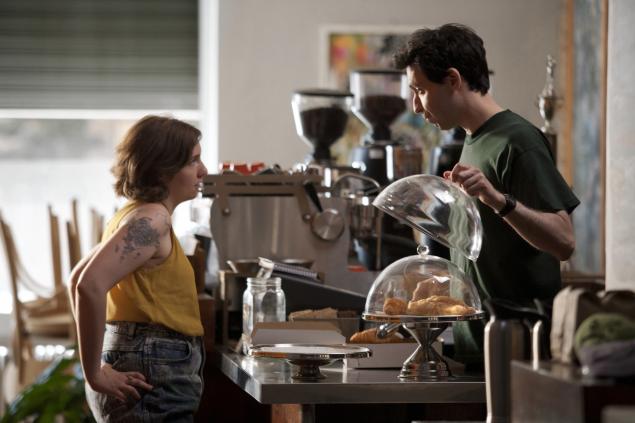For those of you who haven’t seen the award-winning HBO show GIRLS, here’s a quick rundown: GIRLS details the 'real-life/fictional' experiences of four twenty-something besties living in NYC. Season 1, Episode 1 sets the whole story in motion: Hannah— our fellow English major and the main character— receives a special visit from her parents when they drop some awesome news on her:
Hannah’s mom: We’re not going to be supporting you any longer.
Hannah: But I have no job…
Hannah’s mom: No, you have an internship that you say is going to turn into a job.
Hannah: But I don’t know when…?!
Hannah’s mom: You graduated from college two years ago, we’ve been supporting you for two years, and that’s enough.
And there we have it. In the following episodes and seasons, poor English major Hannah learns some lessons the hard way so you don't have to.
LESSON 1: People will try to take advantage of you and your skills.
Unpaid internships suck. Especially when you're like Hannah and have been at it for over a year with zero compensation. In a world where jobs are scarce and competition is stiff, many graduates (with the safety net that many millennials' parents can offer) take unpaid internships with the hopes that they will turn into real jobs. Sometimes they do, sometimes they don't, but either way, a lot of these unpaid internships are actually illegal. (I obviously cannot provide anyone with legal advice, but it doesn't hurt to do some digging on your own and while you're at it, check out the U.S. Department of Labor's page on internships).
However, that being said, sometimes taking an unpaid gig or volunteering can provide valuable insight into work environments and various fields. You just have to make sure that what you're doing is really worth your time. And now it's time for a lil' pep talk: as a graduate with an English degree, remember that you have real skills to offer: writing! editing! creativity! oh my! Not everyone can write, and not everyone can write well. Don't lose sight of that fact. You've spent hours and hours honing your craft in and out of the classroom. Whether you're freelancing or starting your first gig, remember: charge what you're worth, don't do things for free or "for fun" because "you're a writer" and you "enjoy it anyway." No, no, no. Writing is a business, and treat it like that.
LESSON 2: You need real skills. (Writing and editing just ain't gonna cut it no more.)
"Whoa whoa whoa, I thought you were just saying WRITING IS A SKILL?!" Thanks for that stupid, meaningless pep talk.
Ok. Writing totally is a skill. But to start with, you need to have some real world experience, like working in teams, learning to work well in office environments, and all of that other stuff that goes into making you a fancy professional. After all, you're not always going to be staring at a Word doc.
In Season 1 of GIRLS, Hannah approaches her boss at her (unpaid) internship and basically tells him that it's time to get paid. She was hoping that since Joy Lin was hired after being an intern, her time might be coming, too. Her boss says something along the lines of, "Well, Joy Lin knows Photoshop". Hannah begins to obsess over the fact that she doesn't have any skills, which finally brings us to the real part of Lesson 2:
You need real skills. Are you familiar with WordPress? Do you know the ins and outs of Facebook? Do you have a working knowledge of Photoshop? Are you able to easily switch between Mac and PC computers? (You may laugh, but Hannah struggled with this at her first job.) Can you effectively implement SEO strategies into your web copy? Can you translate the thoughts of a business owner into copy for the homepage of their business website in the 'voice' of the brand? These skills are only the beginning of a long list of things employers routinely expect and assume to find in their piles and piles of job applications... in addition to strong writing skills. And even then, what sets you apart? Yeah... getting a job can be complicated.
LESSON 3: Discipline will absolutely-100%-I-promise improve your life.
Discipline is really uncool, but without discipline, I promise your LIFE will be really, reallllllly uncool. Might sound stupid and obvious, but it's true and worth pointing out. In Season 2, Hannah gets an e-book deal, procrastinates on her 'word count' deadlines, has a mental breakdown, and basically ended up needing to write an entire novel in one hour. Then she chops up her hair and stabs her ear with a q-tip because she goes insane. See what will happen if you fail to improve your life with DISCIPLINE? Then, in Season 3 of GIRLS, Hannah turns 25 and starts growing up! She is finally buckling down and staying on schedule with her e-book deadlines. Yay, Hannah! Success is surely in her future (as a result of her newfound discipline. See a theme here? (Or at least a corny fortune cookie quote?)).
Time management is super important and is a big part of this discipline thing for us writers. Whether you're a full-time employee for a corporation or a self-employed writer, not meeting deadlines is absolutely not cool. Buy a calendar and actually write things in it. No, seriously. You are so successful and have so many magazine deadlines and meetings with editors and literary agents that you WILL eventually forget something. Something important.
Also, you probably already know this, but waiting until "creativity strikes" or you're "feeling inspired" is also a really bad way to run your writing career. Sometimes you have to put pen to page and finger to key no matter what. But that's discipline.
If all of these things sound really undoable and terrible to you, then the writerly/editor-y path is probably not for you. Being an English major isn't for wimps.
LESSON 4: Don’t be afraid to take a non-writing job.
After all… what are you going to write about if all you’re doing is writing?! Sure, there are those 9 to 5 jobs that require us to write about pre-determined subjects. But then there are those things in life, like Hannah's memoir, that require her to be out actually living that memoir-worthy life. And this is where having a job that is totally unrelated to writing is awesome!
After an unsuccessful stint as some kind of office assistant, Hannah ends up working as a barista at Grumpy's. Hannah hates it, she's not very good at it, and based on her calculations, probably makes about $40 per day. But this is how she pays some bills while also getting to meet Mr. Handsome Doctor Neighbor and gets lost in Patrick Wilson World for an entire episode, during which she has some great revelations.
Anyway, I digress: try not to feel like a failure if you take a non-writing, non-dream job after college. Seize the opportunity to have a new experience.
And perhaps the most important thing of all: networking! How are you supposed to network with other professionals who may need your writing services when you are only working with OTHER WRITERS?! Working at a totally unrelated job gives you a great opportunity to meet people who know people who know people --> who might need a writer one day. And voilà— it's time for you to get some business cards!
LESSON 5: Don’t underestimate the power of a ‘real’ job.
A lot of creative-types are scared of becoming a dirty good-for-nothing sellout. Whatever your definition may be of this, get over it. A 'real job'— the supposedly soul-sucking 9 to 5 kind— is also the kind of job that offers you healthcare, paid time off, a 401k and if it's a good company with your best interests in mind, even more! (Free snacks and stock options, anyone?!) These are all great things because everyone gets sick and old and enjoys going on vacation while continuing to get paid.
But for some reason, in Season 3, Episode 6 of GIRLS, Hannah totally turns her nose up at her fellow co-workers at her new grown-up gig at GQ:
Hannah: “...I’m not really trying to make a name for myself. I mean, I just kind of want to get in, get out… I’m like, no offense, just like a writer writer, not like a corporate, advertising, working for the man kind of writer.”
Joe: “Who is?”
They proceed to list each others literary successes— Kevin’s a published poet with awards from Yale, Karen’s published some pieces in n+1, and Joe has been published in The New Yorker.
The conversation continues, and Karen laments the plight of the self-employed (if you want to stretch the term) purely 'literary' writer: no health insurance, no dental insurance, and no corporate gym membership. I could elaborate more, but I think you get the point.
Hannah: “But you all still write, like your own pieces and stuff, right? Like your own spiritually fulfilling work?”
And again, this is where the discipline comes into play. Joe tells Hannah that she can write after work, and on the weekends. And you know what? He is so right. Sometimes getting home and writing again after a long day of writing, oh I don't know, descriptions of ugly discount lawn décor is HARD, but ya know,




























































Searching for your first full-time job can feel like a futile endeavor. Unemployment makes you vulnerable and it’s easy to jump at anything that bites. When you finally do receive an offer, negotiating for more money can feel out of the question, or may not even cross your mind. But you should absolutely try to negotiate for more money! We decided to break the ice on this taboo topic by reaching out to our readers for some real-world advice. Read on to find out how they approached their salary negotiations, and what the results were!